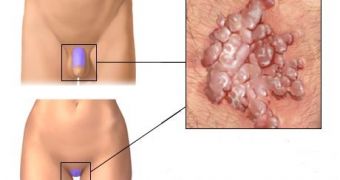Genital warts are really a source of stress and shame and very hard to get rid of, as they can grow back after treatment. And a new report published in the journal of "Sexually Transmitted Diseases" shows that 5.6% of the Americans get this infection, caused mainly by the human papillomavirus (HPV), during their lifespan.
"The recently introduced HPV vaccine-intended to prevent cervical cancer-is likely to lead to reduced rates of genital warts in the future," signaled the report made by a team led by Dr. Thu-Ha Din of the Centers for Disease Control and Prevention.
Nationally representative polls comprising about 11,000 sexually active men and women, aged 18 to 59, delivered data on their sexual behavior and the eventual diagnosis of genital warts along the time.
5.6% of subjects were found to have/have had genital warts. The level was three times higher in women than in men, even when the results were adjusted for various risk factors. Even so, it is hard to say if these results are real, due to the difficulties in the recognition or diagnosis of genital warts.
The highest level of genital warts, 10.5%, was found among women aged 25 to 34, while the most vulnerable male category, 6%, was that aged 35 and 44. Also, the highest infection rates were found in the case of non-Hispanic whites, compared to Hispanics and blacks.
The research showed that the highest risk factor for genital warts was represented by the number of sex partners: the risk of infection boosted by 8 times in the case of those with over 10 lifetime partners, compared to individuals with one or two partners.
The issue with HPV is even more complicated than it seems, as in women, HPV infection can trigger cervical (uterine) cancer, but the virus has also been connected to other cancers too (like throat, anal, penile, vaginal and others).
The new anti-HPV vaccine Gardasil is aimed at preventing cervical cancer and is currently recommended for females aged 9 to 26. The application of this vaccine may also translate into a drop in the number of genital warts cases.

 14 DAY TRIAL //
14 DAY TRIAL //